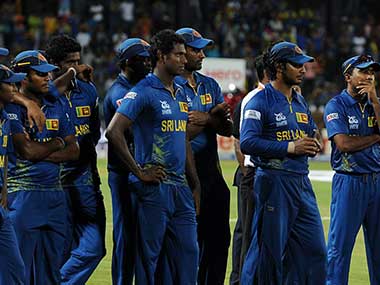Colombo: Last night in Colombo, laughter died. The hurt was writ large on the face of every Sri Lankan fan as he walked out of the R Premadasa stadium and quietly dispersed into the night – still shocked by the numbing defeat. After the win in the semi-final against Pakistan, the streets outside the stadium were jam-packed. It took us around an hour to get back to our hotels, bear in mind that the journey normally takes 10 minutes. But yesterday, the streets were empty as the fans beat a quiet retreat. It was one silent procession. There have been defeats and there was yesterday’s loss – nothing quite comes close to losing at home in front of 35,000 delirious fans; nothing comes close to losing a match where you had the opponents down and out – only one simple jab was needed to knock them out but it never came. So what really happened? Did Sri Lanka choke… yet again? In the last five years, Sri Lanka has reached the finals of four major ICC tournaments. And they’ve lost them all. On one hand, you might say it’s a brilliant record. No other team in world cricket has been as consistent. No other team in world cricket has a bowling attack that is as good. But on the other hand, one might say Sri Lanka’s inability to go past the final hurdle shows that they just aren’t ready to take the final step. In the eyes of many, that’s the difference between the team of 1996 and the team that was moulded by Mahela Jayawardene and Co. A fourth straight loss was very painful, Jayawardene admitted after the final. [caption id=“attachment_482760” align=“alignleft” width=“380”]  Team Sri Lanka after loss. AFP[/caption] “It hurts a lot because you want to do something special, not just personally but for the public as well. We have been playing some really good cricket but unfortunately we haven’t been able to cross that hurdle. As a player, as a cricketer and as an individual, it hurts a lot but you just have to move on and see how well we could get over this and get back on and keep fighting again,” said a visibly emotional Sri Lankan skipper. In the 2007 World Cup final, they ran into Adam Gilchrist who was in a crazy mood. The left-hander smashed 149 off 104 balls. In 2009, Shahid Afridi decided to smash his way to a 50. In 2011, their bowling just didn’t turn up despite a valiant century by Jayawardene. Each defeat must’ve hurt but this was especially bad. It hurts more when you know that you weren’t denied by a freak innings but by your own fallibility. It hurts because you know you weren’t up to the challenge; because you just weren’t good enough. After the game, Jayawardene spoke about how his side lost the momentum after the West Indies assault in the second innings but this wasn’t about momentum. This was an old-fashioned choke. Sian Beilock, an associate professor at the University of Chicago with degrees in cognitive science, kinesiology and psychology, has tested hundreds of athletes and identified what makes people choke. In 2010, she published a book, Choke: What the Secrets of the Brain Reveal About Getting It Right When You Have To. “The first thing to understand is that choking is a real thing, and the second thing to understand is that choking is not random,” she said. “You hear people who choke say afterward that they let their brain get in the way. And there’s truth to that.” According to Beilock, that’s not always the best idea. “Compare it to quickly shuffling down a flight of stairs. You could do that without thought. But if I asked you to do it, and at the same time think about how much you bend your knee each time or what part of your foot is touching the stair, you would probably fall on your face. That’s what happens when people choke. They try to think their way through the action,” Beilock told The New York Times. Her study was based mostly on golfers but it applies just as well to cricket. After finding themselves in a good position, Sri Lanka started over-thinking. They could see victory and they tried to think their way to it. They let their brain take over and in the process; their natural talents took a back seat. For the moment though, the Sri Lankans need to find a way to move on. Jayawardene and Sangakkara may not be around the next time Sri Lanka reach the final of a major tournament but they will hope that the curse of the choke doesn’t pass on to the next generation too. For now, Sri Lanka are the new South Africa and in the world of cricket, that can’t be a good thing.
In the last five years, Sri Lanka has reached the finals of four major ICC tournaments. And they’ve lost them all. Sri Lanka’s inability to go past the final hurdle shows that they just aren’t ready to take the final step.
Advertisement
End of Article


)

)
)
)
)
)
)
)
)



